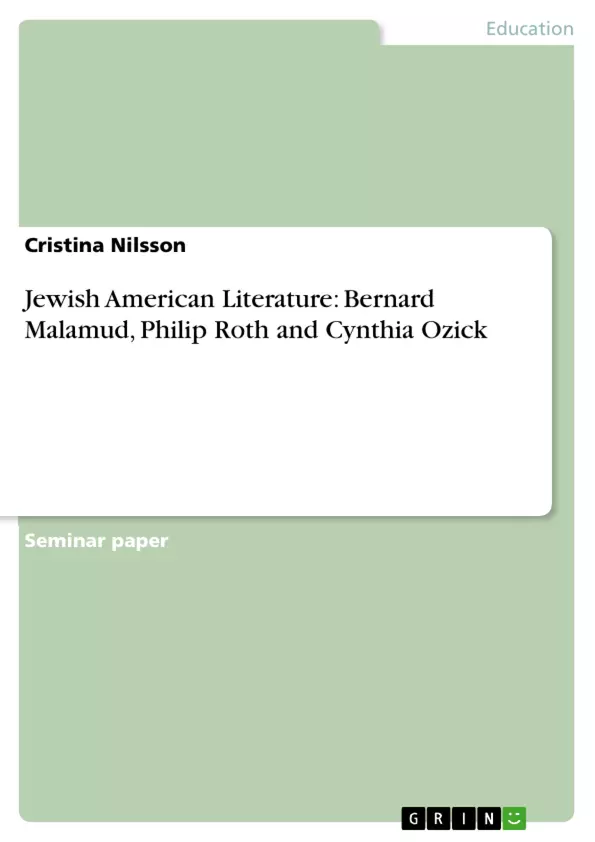Introduction
My work will try to deal with three representatives of Jewish American Fiction, Bernard Malamud, Philip Roth and Cynthia Ozick. The common thread among such authors is the fact that all three novels deal with refugees or their descendants and are all based in Europe, struggling with their Jewishness and living it out in various forms, the Yiddish elements in them and maybe also the implicit criticism or appraisal of each author towards the others (e.g. as a striking example for all “The Messiah of Stockholm” itself is dedicated to Philip Roth). Each of the European countries that constitute the geographical as well as the historical background of the novels offer a different perspective and/or attitude towards Judaism and experience it in a different manner.
The first novel I will examine in my work will be The Fixer by Bernard Malamud, a novel which recreates the story of Mendel Beilis, an ordinary man living in Czarist Russia (1911), who suddenly finds himself accused of the murder of a young Russian boy and so of a ritual murder, according to the age-old lie that Jews kill Christians to use their blood for Passover matzoth 1 (or די מצח 2, the unleavened bread the Jews ate when fleeing from Egypt in the thirteenth century B.C. since in their perilous flight they could not wait long enough to wait for the dough to rise 3) . Throughout his work Malamud delivers a portrait of anti-Semitism, imprisonment, degradation, torture, and human integrity.
At the same time The Fixer works as a resemblance of the Holocaust, which Malamud otherwise deals with only indirectly. 4
Also Ozick in her work The Messiah of Stockholm imagines that the manuscript of Bruno Schulz, a Polish Jew gunned down by the SS in 1942, has resurfaced: an obsessive Swedish critic believing himself Schulz’s son announces that <The Messiah has turned up! Here!>. 5
1 Pg. 719 Chametzky Jules, Felstiner John, Flanzbaum Hilene, Hellerstein Kathryn, Jewish American Literature: A Norton Anthology , New York London 2001
2 Weinreich Ulrich Modern English-Yiddish Yiddish English Dictionary מאַדערן ענגניש – ײדיש װערטעבבוך Schocken Books New York 1977-1968
3 Pg. 220 Rosten Leo, The New Joys of Yiddish Three Rivers Press New York 2001
4 Pg. 719 Chametzky Jules, Felstiner John, Flanzbaum Hilene,
, New York London 2001
5 Pg. 857 Chametzky Jules, Felstiner John, Flanzbaum Hilene, Hellerstein Kathryn, Jewish American Literature: A Norton Anthology , New York London 2001
Inhaltsverzeichnis (Table of Contents)
- Introduction
- Brief Biography of Bernard Malamud
- "The Fixer" by Bernard Malamud
- Brief Biography of Cynthia Ozick
- "The Messiah of Stockholm" by Cynthia Ozick
- Brief Biography of Philip Roth
- "The Prague Orgy" by Philip Roth
- Conclusion
Zielsetzung und Themenschwerpunkte (Objectives and Key Themes)
This work aims to analyze three representative authors of Jewish American Fiction: Bernard Malamud, Philip Roth, and Cynthia Ozick. The focus will be on how these authors explore the experiences of refugees and their descendants, particularly their struggles with Jewish identity in a European context. The novels will be examined for their use of Yiddish elements and their implicit critiques or appreciations of each other's work.
- Jewish identity in diaspora
- Yiddish language and culture
- Anti-Semitism and persecution
- The Holocaust and its impact
- The role of literature in challenging social and political norms
Zusammenfassung der Kapitel (Chapter Summaries)
- Introduction: This chapter introduces the main themes and objectives of the work, outlining the focus on three key Jewish American writers and their respective novels. The chapter also highlights the common thread of exile and the struggle with Jewish identity within a European context.
- "The Fixer" by Bernard Malamud: This chapter examines Malamud's novel, which recreates the story of Mendel Beilis, an ordinary man falsely accused of ritual murder in Tsarist Russia. It explores themes of anti-Semitism, imprisonment, and human integrity.
- "The Messiah of Stockholm" by Cynthia Ozick: This chapter analyzes Ozick's novel, which imagines the resurfacing of Bruno Schulz's manuscript after his death. It delves into themes of the Holocaust, the power of literature, and the complex relationship between Jewish identity and cultural identity.
- "The Prague Orgy" by Philip Roth: This chapter explores Roth's novel, which follows Nathan Zuckerman's journey to Prague in the 1970s. It examines themes of totalitarianism, cultural oppression, and the challenges of artistic expression in a politically restrictive environment.
Schlüsselwörter (Keywords)
This work focuses on Jewish American Fiction, exploring key themes such as Jewish identity in diaspora, Yiddish language and culture, anti-Semitism, the Holocaust, and the power of literature to challenge societal norms. The authors under examination, Bernard Malamud, Cynthia Ozick, and Philip Roth, provide unique perspectives on these themes through their novels, "The Fixer," "The Messiah of Stockholm," and "The Prague Orgy," respectively.
Frequently Asked Questions
Which authors are featured in this study of Jewish American literature?
The work focuses on three major representatives: Bernard Malamud, Philip Roth, and Cynthia Ozick.
What is the central theme of Bernard Malamud's "The Fixer"?
"The Fixer" explores anti-Semitism and human integrity through the story of Mendel Beilis, a man falsely accused of ritual murder in Czarist Russia.
How does Cynthia Ozick address the Holocaust in "The Messiah of Stockholm"?
Ozick imagines the resurfacing of a manuscript by Bruno Schulz, a Polish Jew killed by the SS, exploring the power of literature and the weight of history.
What is the common thread between the three novels discussed?
All three novels deal with refugees or their descendants in Europe, struggling with their Jewish identity and the cultural impact of the diaspora.
What is the significance of Philip Roth's "The Prague Orgy"?
The novel follows Nathan Zuckerman to Prague, examining themes of totalitarianism, cultural oppression, and artistic expression in a restrictive environment.
- Quote paper
- Cristina Nilsson (Author), 2007, Jewish American Literature: Bernard Malamud, Philip Roth and Cynthia Ozick, Munich, GRIN Verlag, https://www.grin.com/document/162893



